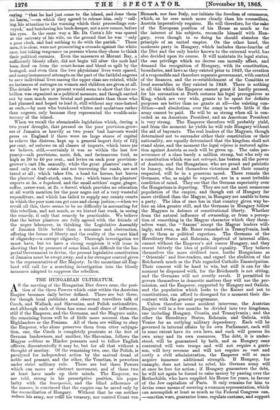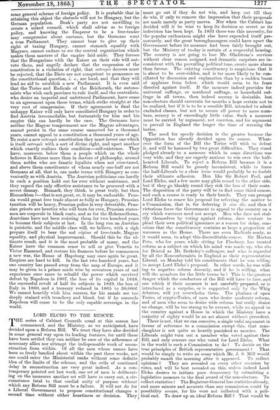PBJi HUNGARIAN 13LT - 1:MATT:TM.
AS the meeting of the Hungarian Diet draws near, the posi- tion of the three Powers which exist within the Austrian Empire becomes daily better defined. There are but three, for though local publicists and observant travellers talk of Czech, and Wallack, and Slavonian, and Polish nationalities, and although each of them has some small share of influence, still if the Emperor, and the Germans, and the Magyars unite, the remaining forces will be of little more account than the Highlanders or the Fenians. All of them are willing to obey the Emperor, who alone preserves them from utter subjuga- tion, one, the Czech is completely prostrate at the feet of German landowners, and another, the Slavonian, follows the Magyar noblesse as Hindoo peasants used to follow English officers, discontentedly it may be, but for all that without a thought of mutiny. Of the remaining two, one, the Polish, is paralyzed for independent action by the mutual dread of noble and peasant, and the other, the Venetian, in powerless under strict military rule. There are but three Powers which can move or obstruct movement, and of these two at least have made up their minds. The Emperor, we are told, strong in his prescriptive position, his popu- larity with the bourgeoisie, and the blind adherence of the masses, is convinced that the empirs can be saved only by the reconciliation of Hungary. 'Without that he can neither reduce his army, nor refill his treasury, nor control Count von Bismark, nor. face Italy, nor initiate the freedom of commerce, which, as he sees much more clearly than his counsellors, Austria imperatively requires. He will therefore, for the sake of the European position of his House as much as for the interest of his subjects, reconcile himself with Hun- gary, even though in so doing he should abandon the principle of an united empire. On the other hand, the moderate party in Hungary, which includes three-fourths of the Diet and the only leader known to the external world, has also decided upon its course. It will maintain its legal status, the one privilege which no decree can morally affect, and demand the recognition of Hungary, with its constitution, boundaries, and laws as they existed prior to 1849, the creation of a responsible and therefore separate government, with control of the finances, and the re-establishment of the Comititts or local assemblies as they existed in 1848. There is nothing in all this which the Emperor cannot grant if hardly pressed, for his coronation at Pesth restores his legal prerogatives as. King, which are very wide, grants to be spent for definite purposes are better than no grants at all—the existing con- dition—and absolutism over the army is worth little if the army cannot be paid. He will be as strong when all is con- ceded as an American President, and an American President is very strong. The Emperor therefore will probably yield, and from the moment he yields he will rule Hungary without the aid of bayonets. The real leaders of the Magyars, though determined not to surrender either their constitution or their nationality, are equally determined that the kingdom shall not stand alone, and the moment the legal regime is restored agita- tion against Austria as such will be given up. The calm per- severance of a class barely a million strong, but who rely on a constitution which was not octroyee, has beaten all the power of Austria, and the Hungarians, who are proud and patriotic to lunacy, who feel themselves victorious and their country respected, will be in a generous mood. There remain the Germans, who, as might be expected, are in a most irritable condition of mind. They see that the German superiority over the Hungarians is departing. They are not the most numerous. population of the empire, and though out of Hungary far more civilized than the Magyar, in Hungary are unable to form a party. The idea of race has in that country given way be- fore an idea greater still, and the Germans in Hungary follow the Magyars in defence of constitutional liberty. Whether from the natural influence of ownership, or from a percep- tion of something in the Magyar character which they them- selves want, the " Saxons" accept the Magyar leaders will- ingly, and even, as Mr. Boner remarked in Transylvania, look up to them as political superiors. The Germans of the Hereditary States and Bohemia, deprived of internal allies, cannot without the Emperor's aid coerce Hungary, and they resent bitterly the idea of political equality. They believe themselves the more civilized race, loathe Hungarians as " Orientals" and free-traders, and regard the abolition of the Reichsrath much as the Pale regarded Catholic Rmancipation. Their consent will be hard to win, but still it can for the moment be dispensed with, for the Reichsrath is not sitting, and the Germans will not overtly revolt. If permitted to govern themselves in domestic matters they will use the per- mission, and the Emperor, supported by Hungary and Galicia, and the population which looks to .the Kaiser and not to- constitutions, can afford to disregard for a moment their dis- content with the general programme. Unless therefore some accident intervene, the Austrian Empire will in a few months be divided into two kingdoms, one including Hungary, Croatia, and Transylvania ; and the other the Hereditary States, Bohemia, and Galicia, with. Venice for an outlying military dependency. Each will be governed in internal affairs by its own Parliament, each will to some extent have its own laws, and each will possess its own army and its own resources. The debt, it is under- stood, will be guaranteed by both, and as Hungary once contented will vote troops and will not require a garri- son, will levy revenue and will not require so vast and costly a civil alyninistra.tion, the Emperor will at once acquire immense additional strength. If Hungary, for example, does not intend to rebel, his German army will at once be free for action ; if Hungary guarantees the debt, he will not again be forced to raise money by passing over the Rothschilds, who have supplied his House for years, in favour of the Jew capitalists of Paris. It only remains for him to devise some means of securing a common representation, which can accomplish at least as much as the Federal Congress can, —sanction wars, guarantee loans, regulate customs, and support some general scheme of foreign policy. It is probable that in attaining this object the obstacle will not be Hungary, but the German population.. Desk's party are not unwilling to create a mixed council, which shall advise as to foreign policy, and knowing the Emperor to be a free-trader may compromise about customs, but the Germans want a true Parliament. They cannot bear to give up their right of taxing Hungary, cannot stomach equality with Magyars, cannot endure to see the central organization which makes them masters of the empire laid aside. They foresee that the Hungarians with the Kaiser on their side will out- vote them, and angrily declare that the suspension of the constitution is a violation of right, that octrege's decrees must be rejected, that the Diets are not competent to pronounce on the constitutional question, i. e., are local, and that they will lend no aid to establish a new Parliament. It is even said that the Tories and Radicals of the Reichsrath, the autono- mists who wish each province to rule itself, and the centralists, who desire an imperial and unfettered Parliament, have come to an agreement upon these terms, which strike straight at the very root of compromise. 1.f their agreement is final the unhappy Kaiser will only have conciliated Hungary in order to find Austria irreconcilable, but fortunately for him and his empire this can hardly be the case. The Germans have neither the Magyar temperament nor the Magyar advantages, cannot persist in the same course unmoved for a thousand years, cannot appeal to a constitution a thousand years of age. To resist a new oetroye'e constitution they must invest one which is itself oetroye'e with a sort of divine right, and upset another which exactly realizes their condition—self-existence. They have, moreover, below them a people which on the whole believes in Kaisers more than in doctors of philosophy, around them nobles who are fanatic loyalists when not over-taxed, and above them constituents of whom nearly one-half are not Germans at all, that is, can make terms with Hungary as con- veniently as with Austria. The Austrian politicians can hardly in such a position hold out for ever without assistance, and they regard the only effective assistance to be procured with a secret dismay. Bismark, they think, is great truly, but then Bismarkism ?—that is not great, or, it may be, endurable. Prus- sia would grant free trade almost as fully as Hungary, Prussian taxation will be heavy, Prussian police is very detestable, Prus- sian priests are heretics who will burn for ever, Prussian states- men are corporals in black coats, and as for the Hohenzollerns, Austrians have not been resisting them for two hundred years to become their subjects at last. In the long run an Austrian is patriotic, and the middle class will, we believe, with a sigh prepare itself to bear the sad regime of free-trade, Magyar equality, and physical improvement. Should this be the ul- timate result, and it is the most probable of many, and the Kaiser have the common sense to sell or give Venetia to Victor Emanuel, and restore his finances before he commences a new war, the House of Hapsburg may once again be great. Empires are hard to kill. In the last two hundred years, but one country has passed away from the map of Europe, and it may be given to a prince made wise by seventeen years of sad experience once more to rebuild the power which survived defeat by Napoleon in 1807, the loss of its capital in 1848, the successful revolt of half its subjects in 1849, the loss of Italy in 1860, and a treasury reduced in 1865 to 30,000/. We cannot heartily wish him success, for his annals are too deeply stained with treachery and blood, but if he succeeds Napoleon will cease to be the only capable sovereign in the world.































 Previous page
Previous page